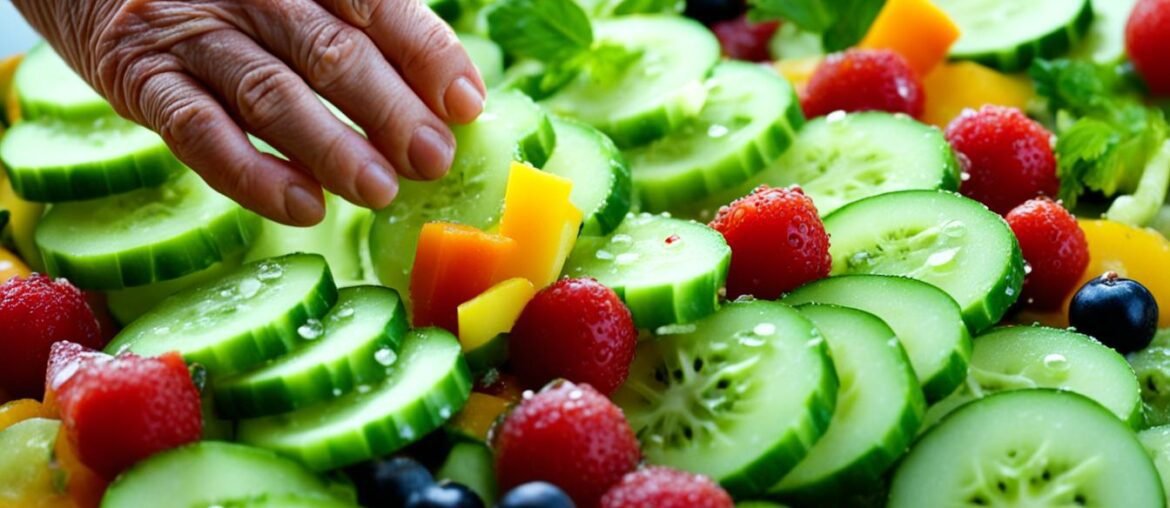Did you know that as we age, our skin becomes more susceptible to dehydration and loses its natural moisture at a faster rate? This can lead to dryness, fine lines, and a dull complexion, making us look older than we actually are. But don’t worry, there are natural ways to combat this and keep your skin hydrated and youthful. In this article, I will share tips and techniques to help you hydrate your aging skin naturally, so you can maintain a healthy and radiant complexion.
Key Takeaways:
- Proper hydration is essential for maintaining healthy and youthful-looking skin as we age.
- Dehydration can lead to dryness, fine lines, and dullness, making the skin appear more aged.
- Using hydrating ingredients and choosing the right moisturizers are key to keeping your skin plump and supple.
- A consistent hydrating skincare routine, a balanced diet, and healthy lifestyle habits are crucial for hydrated and youthful skin.
- Natural remedies, such as homemade masks and treatments, can provide nourishment and hydration to dry and aging skin.
Understanding the Importance of Hydration for Aging Skin
Proper hydration plays a crucial role in maintaining the health and appearance of aging skin. When our skin is dehydrated, it can lead to various signs of aging such as dryness, fine lines, wrinkles, and dullness, making the skin appear more aged. On the other hand, maintaining hydration levels can have numerous benefits for our skin.
The Benefits of Hydrating Skin
- Improved skin elasticity: Proper hydration helps to improve the elasticity of the skin, making it appear firm and plump.
- Reduced appearance of fine lines and wrinkles: Dehydration can accentuate the appearance of fine lines and wrinkles, while hydrating the skin can help minimize their visibility.
- Enhanced skin radiance: Hydrated skin has a natural glow and radiance, while dehydrated skin can appear dull and lackluster.
- Improved overall skin health: Hydration is essential for maintaining the overall health of the skin, ensuring it functions optimally and remains supple.
By understanding the importance of hydration, we can take the necessary steps to ensure our skin stays hydrated and youthful.
The Effects of Dehydration on Aging Skin
Dehydration has negative effects on aging skin, exacerbating the signs of aging and undermining its overall health. When our skin lacks proper moisture, it can lead to:
- Dryness: Dehydrated skin often appears dry, flaky, and rough to the touch.
- Increased appearance of fine lines and wrinkles: Dehydration can make fine lines and wrinkles more prominent, making the skin look aged.
- Loss of firmness and elasticity: Without adequate hydration, the skin loses its firmness and elasticity, resulting in sagging and a loss of youthful contours.
- Dull and lackluster complexion: Dehydration can rob the skin of its natural radiance, leaving it looking dull and lacking vitality.
- Skin irritation and sensitivity: Dehydrated skin is more prone to irritation, redness, and sensitivity.
To prevent these effects and maintain healthy, youthful skin, it is crucial to prioritize hydration.
Hydrating Ingredients for Aging Skin
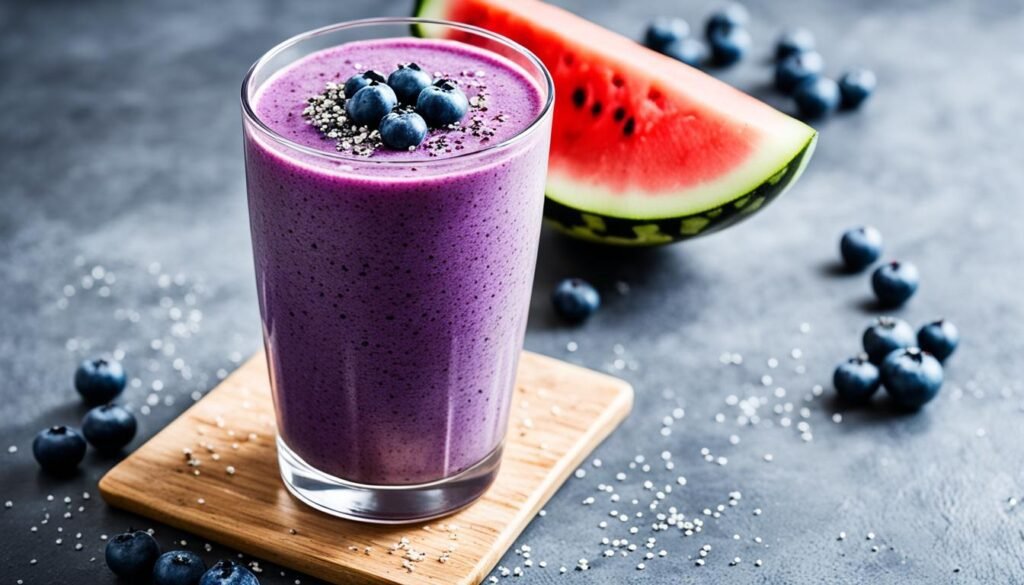
When it comes to hydrating aging skin, certain ingredients can work wonders. Incorporating these hydrating ingredients into your skincare routine can help improve moisture retention, boost skin elasticity, and leave your skin looking plump and supple. Here are some natural ingredients to look for in moisturizers and skincare products for mature skin:
- Hyaluronic acid: This powerful hydrating ingredient attracts and retains moisture in the skin, helping to keep it hydrated and supple.
- Aloe vera: Known for its soothing properties, aloe vera can also hydrate the skin and promote healing.
- Glycerin: Glycerin acts as a humectant, drawing moisture from the environment into the skin and preventing dehydration.
- Ceramides: Ceramides help to strengthen the skin’s natural barrier, improving moisture retention and preventing water loss.
By incorporating these hydrating ingredients into your skincare products, you can effectively combat dryness and maintain hydrated, youthful-looking skin. Don’t forget to check the ingredient list when choosing moisturizers and other skincare products to ensure they contain these beneficial hydrating ingredients!
Incorporating hydrating ingredients into your skincare routine can help improve moisture retention, boost skin elasticity, and leave your skin looking plump and supple.
Creating a Hydrating Skincare Routine
A consistent and effective skincare routine is essential for hydrating aging skin naturally. Follow these steps to establish a daily skincare routine that will help keep your mature skin hydrated and youthful:
- Gentle Cleansing: Start your routine by using a gentle cleanser to remove impurities without stripping the skin of its natural oils. Look for cleansers specifically formulated for mature skin.
- Hydrating Toner: After cleansing, apply a hydrating toner to balance the skin’s pH levels and prepare it for better absorption of subsequent skincare products. Toners with ingredients like rose water or hyaluronic acid can provide an extra boost of hydration.
- Moisturizer: Next, apply a moisturizer rich in hydrating ingredients and antioxidants. Look for products that contain hyaluronic acid, glycerin, or ceramides to lock in moisture and improve skin elasticity. Consider using a separate moisturizer for the delicate eye area.
- Sunscreen Protection: Protect your skin from the sun’s harmful rays by applying a broad-spectrum sunscreen with an SPF of 30 or higher. Ensure that the sunscreen is suitable for daily use and compatible with your skin type.
- Weekly Treatments: Incorporate weekly treatments like face masks or facial oils to provide an extra boost of hydration. Look for masks formulated with hydrating ingredients such as aloe vera or hyaluronic acid.
By following these steps, you can establish a hydrating skincare routine that addresses the specific needs of aging skin. Consistency is key, so make sure to perform these steps daily to maintain optimal hydration and promote a youthful complexion.
Dietary Tips for Hydrating Aging Skin
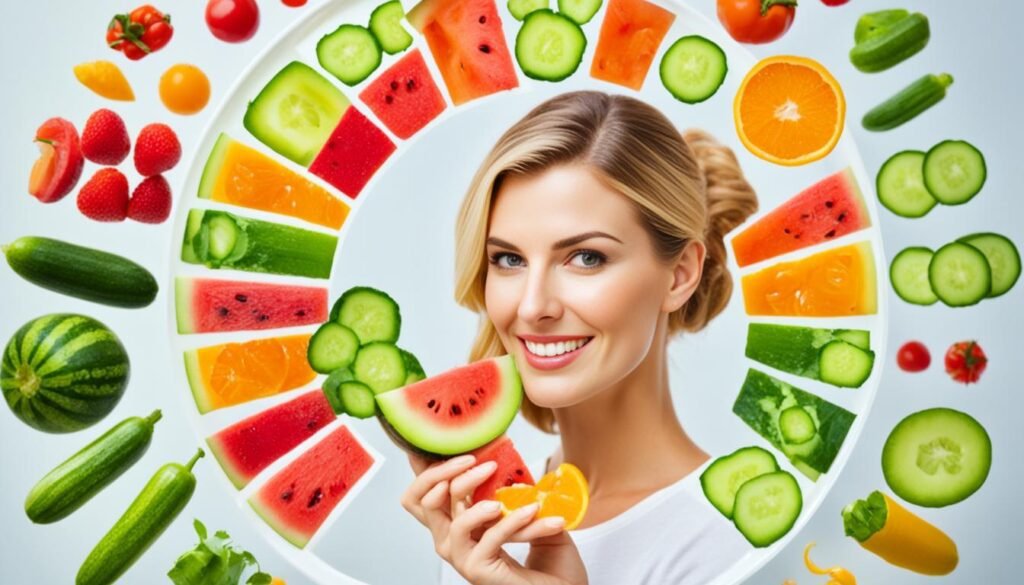
Hydrating aging skin isn’t just about external skincare; it also starts from within. A diet rich in fruits, vegetables, and healthy fats can contribute to skin hydration and overall wellness. Incorporating specific foods into your diet can provide essential nutrients and hydration to promote youthful-looking skin.
Here are some hydration tips for aging skin:
Foods for Hydrated Skin:
1. Watermelon: With its high water content, watermelon is a refreshing and hydrating fruit that can help replenish moisture in the skin.
2. Cucumber: Cucumber is not only hydrating but also rich in antioxidants and vitamins that promote healthy skin.
3. Avocado: Known for its healthy fats and vitamins, avocado nourishes the skin from within and helps maintain hydration.
4. Fatty Fish: Salmon, mackerel, and sardines are excellent sources of omega-3 fatty acids, which boost skin hydration and improve overall skin health.
Nutrients for Skin Health:
To support skin health and hydration, ensure your diet includes the following nutrients:
| Nutrient | Sources |
|---|---|
| Vitamin C | Citrus fruits, berries, bell peppers, broccoli |
| Vitamin E | Almonds, sunflower seeds, spinach, avocado |
| Omega-3 Fatty Acids | Fatty fish, chia seeds, flaxseeds, walnuts |
| Antioxidants | Green tea, berries, dark chocolate, tomatoes |
| Collagen-Boosting Nutrients | Bone broth, citrus fruits, leafy greens, nuts |
Remember, staying hydrated by drinking an adequate amount of water throughout the day is crucial for maintaining youthful and hydrated skin. Incorporating a combination of hydrating foods and skin-boosting nutrients into your diet can support healthy, glowing skin from the inside out.
Lifestyle Habits for Hydrated and Youthful Skin
In addition to a proper skincare routine and a balanced diet, adopting certain lifestyle habits can greatly contribute to maintaining hydrated and youthful-looking skin. By incorporating these habits into your daily life, you can prevent dehydration and promote optimal skin health.
Protect Your Skin from Excessive Sun Exposure
Exposing your skin to the sun’s harmful UV rays can lead to dehydration and premature aging. Make sure to apply a broad-spectrum sunscreen with at least SPF 30 every day, even on cloudy days.
Reduce Stress Levels
Chronic stress can have a negative impact on your skin’s health. It can disrupt the skin’s natural barrier function, leading to dehydration and inflammation. Incorporate stress-reducing activities into your daily routine, such as meditation, deep breathing exercises, or engaging in hobbies you enjoy.
Get Enough Sleep
Getting adequate sleep is essential for maintaining healthy skin. During sleep, the body repairs and rejuvenates itself, including the skin. Aim for 7-9 hours of quality sleep each night to support optimal skin hydration and overall well-being.
Avoid Excessive Alcohol Consumption and Smoking
Both alcohol and smoking can dehydrate the skin and accelerate the aging process. Alcohol is a diuretic, causing increased urine production and dehydration. Smoking, on the other hand, restricts blood flow to the skin, making it appear dull and dehydrated. Limit alcohol consumption and quit smoking to promote hydrated and youthful-looking skin.
By implementing these lifestyle habits into your daily routine, you can support the hydration and overall health of your skin, helping it appear youthful and radiant.
| Lifestyle Habits | Benefits |
|---|---|
| Protecting your skin from excessive sun exposure | Prevents dehydration and premature aging |
| Reducing stress levels | Supports skin barrier function and reduces inflammation |
| Getting enough sleep | Promotes skin repair and rejuvenation |
| Avoiding excessive alcohol consumption and smoking | Prevents skin dehydration and premature aging |
Natural Remedies for Dry and Aging Skin
If you prefer natural remedies, there are several options to hydrate dry and aging skin. Incorporating homemade masks or treatments with nourishing and hydrating ingredients can be an effective way to improve the health and appearance of your skin.
- Olive oil: Rich in antioxidants and healthy fats, olive oil can help moisturize and nourish dry skin. Apply a small amount to your face and gently massage it into your skin. Leave it on for about 15 minutes before rinsing it off with warm water.
- Avocado: Avocado is packed with hydrating properties and beneficial fatty acids. Mash half an avocado and mix it with honey to create a hydrating face mask. Apply the mask to your skin and leave it on for 15-20 minutes before rinsing it off.
- Honey: Honey is a natural humectant that helps retain moisture in the skin. Create a simple honey mask by applying a thin layer of honey to your face. Leave it on for 15-20 minutes and rinse it off with warm water for hydrated and smooth skin.
- Oatmeal: Oatmeal can soothe and moisturize dry skin. Blend a small amount of oatmeal into a fine powder and mix it with warm water to create a paste. Apply the paste to your face, leave it on for 15 minutes, and rinse it off gently for refreshed and hydrated skin.
These natural remedies can provide the hydration and nourishment your skin needs. However, it’s important to remember that individual skin types and conditions may vary. If you have chronic skin conditions or allergies, it’s best to consult with a dermatologist before trying any new home remedies.
The Role of Humidifiers in Hydrating Aging Skin
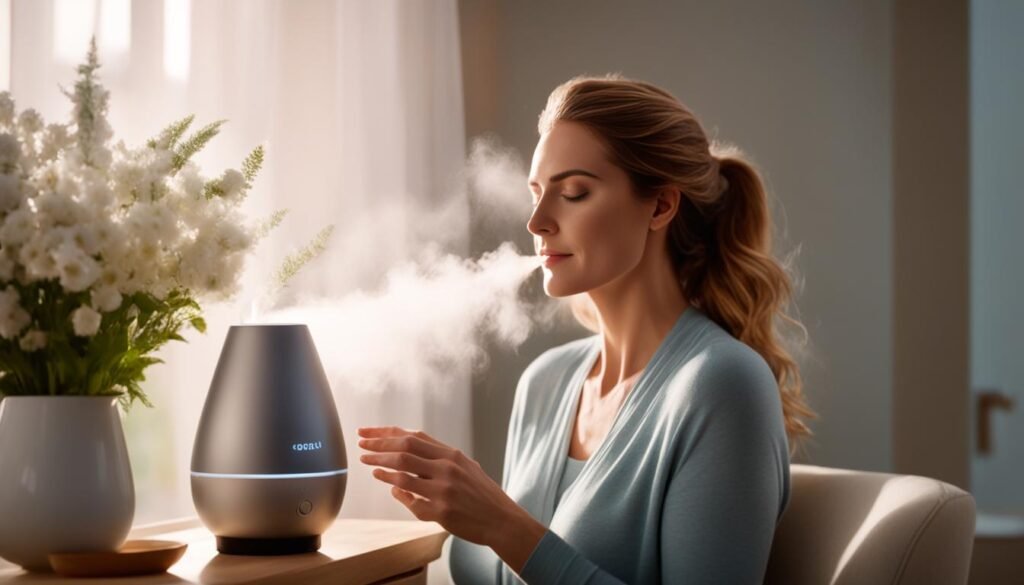
Humidifiers play a crucial role in skin hydration, especially for aging skin, particularly in dry environments. These devices increase the moisture level in the air, creating a more humid environment that helps prevent excessive evaporation of moisture from the skin. This, in turn, promotes optimal skin hydration, preventing dryness and irritation that can contribute to the appearance of fine lines and wrinkles.
Using a humidifier in your bedroom or living area can have several benefits for mature skin:
- Improved hydration: The increased humidity provided by a humidifier helps replenish moisture in the skin, leaving it feeling hydrated and supple.
- Enhanced skin barrier function: Dry air can compromise the skin’s natural protective barrier, leading to water loss. By maintaining a more humid environment, humidifiers help to strengthen the skin’s barrier function and reduce the risk of moisture loss.
- Relief for dry, itchy skin: Dry air can exacerbate skin conditions like eczema and psoriasis, causing irritation and itchiness. Using a humidifier can help alleviate these symptoms by adding moisture to the air and soothing dry skin.
- Improved overall skin health: Hydrated skin is more resilient and better equipped to fight signs of aging. By using a humidifier regularly, you can support the health and vitality of your skin.
To maximize the benefits of using a humidifier for mature skin:
- Select the right type of humidifier: There are various types of humidifiers available, such as cool mist, warm mist, and ultrasonic. Consider your preferences, the size of the room, and any specific features you may desire when choosing a humidifier.
- Maintain appropriate humidity levels: Aim for a humidity level between 40% and 60% to ensure optimal skin hydration without creating excessive moisture that can promote mold or mildew growth.
- Clean and maintain your humidifier regularly: Regular maintenance of your humidifier is essential to prevent the buildup of mold, bacteria, and mineral deposits that can be released into the air. Follow the manufacturer’s instructions for cleaning and replacing filters to ensure optimal performance.
- Use distilled or filtered water: Using distilled or filtered water in your humidifier can help minimize the release of minerals into the air and reduce the risk of mineral buildup in the device.
By incorporating a humidifier into your skincare routine, you can help combat the effects of dry air and maintain hydrated, youthful-looking skin. Remember to consult with a dermatologist or skincare professional for personalized advice on incorporating a humidifier into your skincare regimen.
Humidifier Tips:
Invest in a humidifier with a built-in humidistat to monitor and maintain optimal humidity levels in your living space.
The Best Moisturizers for Mature Skin
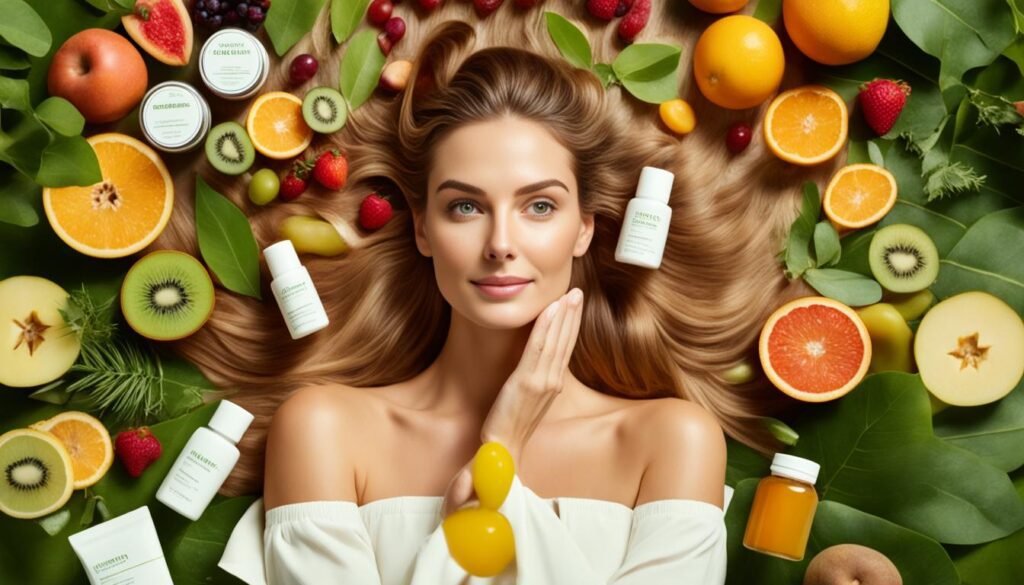
Choosing the right moisturizer is crucial for hydrating mature skin. As we age, our skin tends to become drier and loses its natural moisture. To combat this, it’s important to look for products specifically formulated for aging skin. These moisturizers are designed to address the unique needs of mature skin and provide optimal hydration.
When selecting a moisturizer for mature skin, consider ingredients that are known for their hydrating properties. Hyaluronic acid is a standout ingredient as it can hold up to 1000 times its weight in water, making it extremely effective in replenishing moisture. Peptides are another beneficial ingredient that helps to improve skin elasticity and firmness, reducing the appearance of fine lines and wrinkles.
Vitamins such as vitamin C and vitamin E are also beneficial in moisturizers for mature skin. Vitamin C brightens the complexion and boosts collagen production, while vitamin E nourishes the skin and protects against free radicals.
It’s important to choose a moisturizer that suits your specific skin type and concerns. If you have dry skin, opt for a richer, creamier texture that provides intense hydration. If you have oily or combination skin, look for lightweight, oil-free formulations that won’t clog pores.
Here are some top recommendations for the best moisturizers for mature skin:
- Brand A: This moisturizer is specifically formulated for mature skin and contains hyaluronic acid and peptides to hydrate and firm the skin. It also has SPF 30 to protect against sun damage.
- Brand B: With a blend of vitamin C, vitamin E, and botanical extracts, this moisturizer brightens the skin, reduces dark spots, and provides long-lasting hydration.
- Brand C: This lightweight moisturizer is perfect for oily or combination skin. It contains niacinamide and ceramides to balance oil production and hydrate without clogging pores.
- Brand D: If you prefer a more natural option, this moisturizer is formulated with organic ingredients like aloe vera and jojoba oil. It deeply nourishes and soothes mature skin.
Remember to always patch test new products and consult with a dermatologist if you have any skin concerns or allergies. Finding the best moisturizer for your mature skin can make a significant difference in maintaining a hydrated, youthful complexion.
Conclusion
After exploring various aspects of hydrating aging skin naturally, it is clear that proper hydration is essential for maintaining a youthful and radiant complexion. By implementing a holistic approach that includes a well-rounded skincare routine, a balanced diet, and healthy lifestyle habits, you can effectively combat the signs of aging and keep your skin hydrated.
Understanding the importance of hydration and incorporating hydrating ingredients, such as hyaluronic acid and aloe vera, can significantly improve the moisture levels in your skin. Additionally, following a consistent skincare routine that includes cleansing, toning, moisturizing, and protecting your skin from sun damage is key in maintaining optimal hydration.
Remember to pay attention to your skin’s needs and consult with a dermatologist for personalized advice, especially if you have specific concerns or chronic skin conditions. By taking proactive measures and prioritizing hydration, you can achieve a more youthful and vibrant complexion for years to come.
FAQ
What are the benefits of hydrating aging skin naturally?
Proper hydration helps improve skin elasticity, reduce the appearance of fine lines and wrinkles, and promote a more radiant and youthful complexion.
What are some hydrating ingredients for aging skin?
Hyaluronic acid, aloe vera, glycerin, and ceramides are excellent choices for boosting hydration and improving skin elasticity.
How can I create a hydrating skincare routine for aging skin?
Start with a gentle cleanser, followed by a hydrating toner, moisturizer, and sunscreen. Incorporate weekly treatments like face masks or facial oils for an extra boost of hydration.
Are there any natural remedies to hydrate dry and aging skin?
Yes, ingredients like olive oil, avocado, honey, and oatmeal can be used in homemade masks or treatments to provide nourishment and hydration to the skin.
How can I hydrate aging skin from within?
Maintain a diet rich in fruits, vegetables, and healthy fats, and drink an adequate amount of water throughout the day to promote skin hydration and overall wellness.
What lifestyle habits can contribute to hydrated and youthful skin?
Protect your skin from excessive sun exposure, reduce stress levels, get enough sleep, and avoid excessive alcohol consumption and smoking.
How do humidifiers help in hydrating aging skin?
Humidifiers increase the moisture level in the air, preventing excessive evaporation of moisture from the skin and promoting optimal skin hydration.
What are the best moisturizers for mature skin?
Look for products specifically formulated for aging skin, with hydrating ingredients like hyaluronic acid, peptides, and vitamins.
Why is hydration important for aging skin?
Proper hydration helps to maintain healthy and youthful-looking skin, preventing dryness, fine lines, wrinkles, and dullness.
What is the role of hydration in maintaining youthful skin?
Effective hydration improves skin elasticity, plumpness, and overall radiance, helping to maintain a more youthful appearance.

